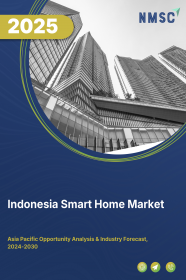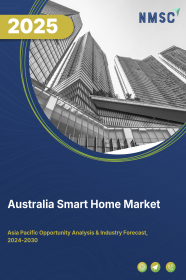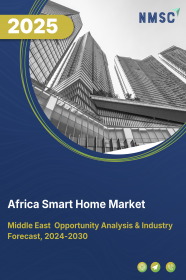
Indonesia Smart Home Market by Communication Protocol (Wi-Fi, Zigbee, Z-Wave, Bluetooth, and Thread), by Smart Home Hubs (Standalone Hubs and Built-in Hubs), by Voice Assistants Integration (Amazon Alexa, Google Assistant, Apple Siri, and Others), by Product Type (Smart Lighting, Smart Home Security & Surveillance, Smart Entertainment, and Smart Appliances) – Opportunity Analysis and Industry Forecast, 2024–2030
Industry: Retail and Consumer | Publish Date: 15-Feb-2025 | No of Pages: 173 | No. of Tables: 134 | No. of Figures: 79 | Format: PDF | Report Code : RC2279
US Tariff Impact on Indonesia Smart Home Market
Trump Tariffs Are Reshaping Global Business
Indonesia Smart Home Market Overview
The Indonesia Smart Home Market size was valued at USD 1.31 billion in 2023, and is predicted to reach USD 6.89 billion by 2030, at a CAGR of 26.8% from 2024 to 2030. A smart home, also referred to as a connected home, is a residential space equipped with cutting-edge technology and automation systems. Smart home systems allow for the centralized control and monitoring of a wide range of household devices, appliances, and security features through a unified network. These intelligent devices is managed remotely and often respond to voice commands or pre-set schedules, providing homeowners with enhanced convenience, energy efficiency, and security. Connected homes typically incorporate components such as smart thermostats, lighting systems, security cameras, voice assistants, and other interconnected devices, all aimed at enhancing the overall living experience.
Government Incentives and Eco-Conscious Living Drives Smart Home Adoption
Government incentives and increasing awareness of eco-conscious living are motivating consumers to invest in smart home solutions such as energy-efficient lighting, smart thermostats, and solar panels.
These technologies empower homeowners to monitor and reduce their energy consumption, aligning with sustainability goals and reducing carbon emissions. In 2022, MPCT Indonesia announced a four-part mission, including supporting decarbonization efforts to reduce emissions by 50% and achieve the country's NDC target.
Additionally, they aim to foster the development of green business unicorns, establish a network of influential leaders committed to sustainable growth, and empower change agents to lead sustainability initiatives. As Indonesia prioritizes green initiatives, connected homes play a crucial role in achieving energy efficiency and contributing to a cleaner, more sustainable future, further driving the Indonesia smart home market demand.
Thriving Economy and Rising Disposable Income Propels the Market Growt
The thriving Indonesian economy, coupled with the increasing disposable income of its citizens, is fostering a favourable environment for the expansion of the smart home market. According to the Asian Development Outlook (ADO) 2022, Indonesia's economic landscape is witnessing a steady uptrend in consumer spending and manufacturing activity, driven by rising incomes, job opportunities, and heightened consumer confidence.
Additionally, the investment sector is experiencing significant gains due to expanding demand, an improved business climate, and a rebound in credit availability. As more Indonesians enjoy greater purchasing power and confidence in the economy, the appeal of innovative and convenient home appliances, including connected home devices, is on the rise.
Security and Privacy Issues Pose a Hurdle to the Market Growth
The widespread adoption of interconnected systems brings about vulnerabilities, particularly with smart gadgets such as thermostats, cameras, and door locks being susceptible to hacking.
These security threats are frequently the result of weak passwords and inadequate Wi-Fi security measures, giving hackers openings to gain unauthorized access and compromise residents' privacy and safety by manipulating devices or accessing sensitive information.
To tackle these issues, homeowners need to implement strict password policies, consistently update device software, and enhance home network security to reduce the risk of cyber-attacks and safeguard their smart homes from potential breaches.
Integration of Blockchain Technology into Smart Home Devices Presents Lucrative Opportunities for Market Expansion
Renowned for its robust security and transparent characteristics, blockchain technology offers substantial potential to enhance the security and privacy of smart home systems. Through encryption and secure storage, it safeguards sensitive connected home data, empowering users to control access permissions and minimizing the risk of unauthorized intrusion. Blockchain technology authenticates device identities, ensuring that only trusted devices interact within the connected home network.
Additionally, it streamlines processes through tamper-proof smart contracts. Furthermore, blockchain technology decentralizes device control, mitigates vulnerabilities, and simplifies transparent access control and permissions management. By incorporating blockchain into smart homes, security and privacy are bolstered, fostering a safer and more confidential environment. Consequently, this integration is poised to generate significant opportunities, driving the Indonesia smart home market growth.
Competitive Landscape
Several market players operating in the Indonesia smart home industry include Honeywell International, Inc., Schneider Electric home automation, ABB Ltd , Amazon.com, Inc., Samsung Electronics Co., Ltd., LG Electronics, Google LLC, Hitachi, Ltd., Xiaomi Inc., Sony Corporation, V2 Indonesia, General Electric Indonesia, Snap One, LLC, Siemens AG, BARDI Smart Home.
Indonesia Smart Home Market Key Segments
By Communication Protocol
-
Wi-Fi
-
Zigbee
-
Z-wave
-
Bluetooth
-
Thread
By Smart Home Hubs
-
Standalone Hubs
-
Built-in Hubs
By Voice Assistants Integration
-
Amazon Alexa
-
Google Assistant
-
Apple Siri
-
Others
By Product Type
-
Smart Lighting
-
Smart Bulbs
-
Smart Light Strips
-
Smart Switches
-
-
Smart Home Security and Surveillance
-
Smart Cameras
-
Video Doorbells
-
Smart Locks
-
Security System
-
-
Smart Entertainment
-
Smart TVs
-
Smart Speakers
-
Streaming Devices
-
-
Smart Appliances
-
Smart Refrigerators
-
Smart Ovens
-
Smart Washing Machines
-
Smart Dishwashers
-
Smart Home HVAC Management
-
Other Smart Appliances
-
By Smart Home Compatibility with Smartphones
-
iOS
-
Android
By Installation
-
DIY Installation
-
Professional Installation
By Sales Channel
-
Online Retailers
-
Retailers
REPORT SCOPE AND SEGMENTATION:
|
Parameters |
Details |
|
Market Size in 2023 |
USD 1.31 Billion |
|
Revenue Forecast in 2030 |
USD 6.89 Billion |
|
Growth Rate |
CAGR of 26.8% from 2024 to 2030 |
|
Analysis Period |
2023–2030 |
|
Base Year Considered |
2023 |
|
Forecast Period |
2024–2030 |
|
Market Size Estimation |
Billion (USD) |
|
Growth Factors |
|
|
Companies Profiled |
15 |
|
Market Share |
Available for 10 companies |
|
Customization Scope |
Free customization (equivalent up to 80 working hours of analysts) after purchase. Addition or alteration to country, regional, and segment scope. |
|
Pricing and Purchase Options |
Avail customized purchase options to meet your exact research needs. |
KEY PLAYERS
-
Honeywell International, Inc.
-
Schneider Electric home automation
-
ABB Ltd
-
Amazon.com, Inc.
-
Samsung Electronics Co., Ltd.
-
LG Electronics
-
Google LLC
-
Hitachi, Ltd.
-
Xiaomi Inc.
-
Sony Corporation
-
V2 Indonesia
-
General Electric Indonesia
-
Snap One, LLC
-
Siemens AG
-
BARDI Smart Home

















 Speak to Our Analyst
Speak to Our Analyst




















